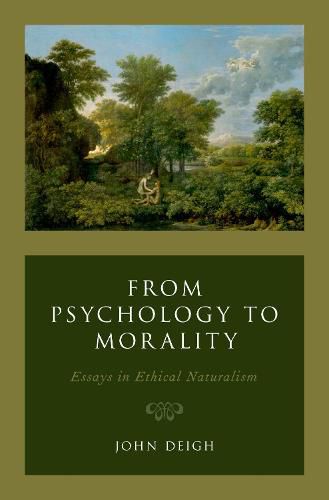Readings Newsletter
Become a Readings Member to make your shopping experience even easier.
Sign in or sign up for free!
You’re not far away from qualifying for FREE standard shipping within Australia
You’ve qualified for FREE standard shipping within Australia
The cart is loading…






The essays in this collection belong to the tradition of naturalism in ethics. The tradition goes back to the beginnings of moral philosophy in ancient Greek thought. Its program is to explain moral thought and action as wholly natural phenomena. Its aim, in other words, is to explain such thought and action without recourse to either a reality separate from that of the natural world or volitional powers that operate independently of natural forces. Its greatest exponent in ancient thought was Aristotle. In modern thought Hume and Freud stand out as the most influential contributors to the tradition. All three thinkers made the study of human psychology fundamental to their work in ethics. All three built their theories on studies of human desires and emotions and assigned to reason the role of guiding the actions that spring from our desires and emotions toward ends that promise self-fulfillment and away from ends that are self-destructive. The collection’s essays draw inspiration from their ideas.
Its twelve principal essays are arranged to follow the lead of Aristotle’s and Hume’s ethics. The first three survey and examine general theories of emotion and motivation. The next two focus on emotions that are central to human sociability and that contemporary Anglo-American philosophers discuss under the rubric of reactive attitudes. Turning to distinctively cognitive powers necessary for moral thought and action, the sixth and seventh essays discuss the role of empathy in moral judgment and defend Bernard Williams’s controversial account of practical reason. The final five essays use the studies in moral psychology of the previous chapters to treat questions in ethics and social philosophy. The treatment of these questions exemplifies the implementation of a naturalist program in these disciplines.
$9.00 standard shipping within Australia
FREE standard shipping within Australia for orders over $100.00
Express & International shipping calculated at checkout
The essays in this collection belong to the tradition of naturalism in ethics. The tradition goes back to the beginnings of moral philosophy in ancient Greek thought. Its program is to explain moral thought and action as wholly natural phenomena. Its aim, in other words, is to explain such thought and action without recourse to either a reality separate from that of the natural world or volitional powers that operate independently of natural forces. Its greatest exponent in ancient thought was Aristotle. In modern thought Hume and Freud stand out as the most influential contributors to the tradition. All three thinkers made the study of human psychology fundamental to their work in ethics. All three built their theories on studies of human desires and emotions and assigned to reason the role of guiding the actions that spring from our desires and emotions toward ends that promise self-fulfillment and away from ends that are self-destructive. The collection’s essays draw inspiration from their ideas.
Its twelve principal essays are arranged to follow the lead of Aristotle’s and Hume’s ethics. The first three survey and examine general theories of emotion and motivation. The next two focus on emotions that are central to human sociability and that contemporary Anglo-American philosophers discuss under the rubric of reactive attitudes. Turning to distinctively cognitive powers necessary for moral thought and action, the sixth and seventh essays discuss the role of empathy in moral judgment and defend Bernard Williams’s controversial account of practical reason. The final five essays use the studies in moral psychology of the previous chapters to treat questions in ethics and social philosophy. The treatment of these questions exemplifies the implementation of a naturalist program in these disciplines.